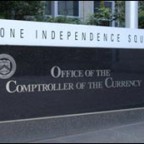OCC’s Enforcement Actions – Heads It Wins, Tails It Wins – The Akahoshi Case

The OCC has done it again.
It gives up on a prohibition proceeding lasting many years against Laura Akahoshi, a former bank officer, only to trash her in its public decision dismissing the case, thereby making it nearly impossible for her to find employment in the banking industry. It’s almost as good as prohibiting her legally from the banking industry but without having to prove why.
The Acting Comptroller’s decision selectively chooses unproven allegations from the complaint and the administrative law judge’s (ALJ) recommended decision and impugns her integrity even as it dismisses the case based on the ALJ’s failure to tie the alleged facts to the statutory standards to ban her from banking.
This is not the first time that the Comptroller has done this. Far from it.
As Ms. Akahoshi’s brief states (pages 11-12):
The OCC has, in multiple instances, relentlessly litigated against an administrative respondent only to abruptly drop the charges or to issue a final decision chock-full of adverse factual findings and legal interpretations but dismissing in an attempt to avoid judicial review….
The OCC’s efforts succeed – by the undersigned’s count, only four OCC enforcement actions have been subject to direct judicial review in nearly a quarter century, and in three of them, the court of appeals reversed the agency in whole or in part…
Worse, the OCC and the other agencies that enforce Section 1818 endorse the OCC’s regulation-by-dismissal practice by treating the OCC ‘dismissal’ decisions as authoritative precedent…
It would come as no surprise if the OCC does the same with the Final Decision here by relying on it, for example, as precedent for a future Section 481 enforcement action…
The provisions of 12 USC 481 grant the Comptroller the right to examine banks but do not address the obligation of banks and bank institution-affiliated parties (IAPs) to provide the Comptroller with all information and documents in possession of the bank. In the Final Decision, the Acting Comptroller mistakenly asserted that Ms. Akahoshi may have violated 12 USC 481.
The record of the case also reveals the habitual practice of ALJs for the banking agencies to defer to examiner opinions, making it exceedingly difficult for a target to prove that the examiners were wrong, and the willingness to stretch the meaning of undefined statutory terms to manufacture or strengthen the case against the target.


